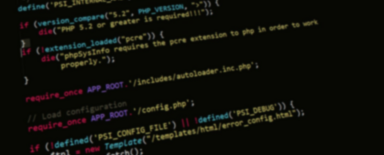
Why is it Good to Choose the Laravel Framework?
Laravel is one of the open-source PHP frameworks built on Symfony. Access to ready-made components, a high level of security, and numerous tools aimed at improving application development – all this makes it used in projects for many industries. From this article, you can learn which projects Laravel is used for.
Laravel - a framework created in PHP
Laravel is a framework built using PHP – an open-source programming language that has been at the forefront of the most popular backend languages for years. One significant advantage is associated with the open nature of the language – it's been developed and used by a wide range of programmers who constantly improve this technology. In addition, statistics show that most websites were created in PHP.
Thanks to the popularity of this language and the large community gathered around it, Laravel users can easily find answers to their questions related to programming using Laravel and PHP. The hosting services for PHP-based webpages are known for their affordable prices, so publishing your websites doesn't cost much.
Laravel itself has numerous features and tools, thanks to which programming is efficient and trouble-free, listed below are the most important among them.
MVC pattern
This open framework is based on the MVC (Model-View-Controller) architectural pattern. It allows the developer to create an application and maintain an organised structure, consisting of three parts:
- model - describes the data and the relations between them,
- view - defines the application's appearance (what the user can interact with),
- controller – mediates the exchange of information between the model and view layers.
To put it simply, the code is spread across multiple model, view, and controller files. This type of approach facilitates introducing changes to the code, makes it reusable and scalable. Using the MVC pattern means that Laravel can be used both for creating simple and lightweight applications, during the development of which time matters, as well as for creating websites and applications with many functionalities.
Choosing the right framework can significantly speed up the application development process and reduce the cost of creating it. Are you wondering what else makes Laravel a willingly used framework?
Authentication in an application created in Laravel
Today, corporate websites are exposed to numerous dangers. Examples of the attack forms include:
- cross-site forgery request – based on forcing the browser of the attacked person to perform an unauthorised action. The purpose of this attack is to lead to actions that can only be performed by a logged-in user, e.g. changing the authentication data or even making unauthorised transfers.
- SQL injections – based on injecting a fragment of SQL code into the application. This may have several consequences, e.g. granting the attacker access to the database, allowing for the possibility of modifying this data.
These are obviously only two types of attacks but describing them was certainly enough to convince you that advanced security solutions are extremely important to your business.
Laravel is known for being one of the most modern authentication systems. All sent requests and searches are immune to unauthorised access. The framework is equipped with systems that protect against both CSRF and XSS, e.g. special CSRF filters that catch requests from unidentified sources. The applications developed in this framework are also protected against many attacks that take advantage of security vulnerabilities. Laravel allows you to protect your application against SQL injection using Fluent Query Builder or Eloquent, which will simply write the invalid query text in the database without any serious consequences for your database.
Multiple security features make this framework ideal for applications that use sensitive customer data or are used to make payments.
Using Laravel allows you to shorten the creation time and reduce the budget
Creating a website or application that can then be easily equipped with additional functionalities doesn't have to take long if you choose the right framework. Laravel is very often the first choice for projects where short lead times are key. What makes coding with this platform so fast?
Developers have good documentation and the support of a large community that uses this technology, so if they encounter a problem they can easily find a solution.
The framework is equipped with many tools that make the work of programmers easier. They definitely appreciate Artisan, which is the command line. You simply enter the command you need and Laravel does for you all the things you’d have to do manually. Artisan eliminates many repetitive tasks that take up programmers’ time.
Laravel offers a set of functionalities that allow you to perform unit testing within a special PHPUnit framework. Laravel allows you to run multiple unit tests at the same time, making the testing quicker.
Laravel's performance
Laravel allows to optimise the application built on it, thanks to which your product will handle a lot of traffic on the website. The most important thing is for the application to run on the latest version of PHP, because each of the new versions of the technology involves changes that can affect the performance. The Laravel Debugbar package allows you to monitor the performance of your platform. In addition there are many website optimisation techniques such as caching configuration or Route Caching. Thanks to that, an application or website created in Laravel can work efficiently and guarantee a good UX for the users of your product.
Flexibility
In the case of frameworks, flexibility can be understood as adjusting the created application to the needs of a specific client. The ability to personalise business solutions is extremely important. Every industry has its own individual expectations, and requires a tailor-made solution, regardless of whether the created system is to serve the company's team or its clients.
You can easily add new, useful functionalities to an application created in Laravel thanks to the code transparency resulting from the MVC architecture. You don't need to immediately invest in complex systems that will take a long time to build and consume a lot of money. You can safely modify them as your business grows.
Laravel's flexibility results not only from the clean code, but also from numerous packages that can be used by the programmer to easily and quickly create business solutions with functionalities relevant to the client. Laravel offers loads of packages – such as Entrust, allowing you to add permissions to users based on the roles created in the application. There are also packages containing solutions for efficient user verification (Laravel User Verification, Socialite) and for creating anti-spam protection (No Captcha). These are just a few of the packages, and there are many more. Some packages are designed for specific industries (e.g. e-commerce), allowing for adapting an application built in Laravel to very specific client requirements.
Easy integration with other applications and tools
The platforms built in this framework can be easily integrated with other important systems, which improves work in the company and increases its efficiency. Laravel allows you to integrate various payment methods, marketing automation tools, analytical tools, and other systems that your company uses on a daily basis. It's also possible to integrate the solutions created by other companies with an application written in this framework.
Laravel vs Symfony - what are the differences between these frameworks?
I've already mentioned that Laravel was built based on Symfony. Both PHP frameworks were launched in 2011. These open source technologies are constantly updated (the latest versions appeared in 2020). They both base their operation on the MVC pattern. You can find a detailed comparison between Symfony and Laravel on our blog. Below you’ll see some of the most important differences.
- Laravel allows you to quickly start working on a project. It doesn’t require such detailed configuration as Symfony. This means that if time matters, you should consider creating your business solution in Laravel.
- Symfony uses the Twig template engine, while Laravel uses Blade. The latter, considered simpler, allows you to insert any PHP code into the skin's body, while the former uses special filters in order to modify the data.
- Developers choose Laravel when the time needed to create a product is the most important factor, while Symfony is used to implement time-consuming and complex projects.
- Symfony is less automated than Laravel. Creating the exact same functions in Symfony requires writing more code. Laravel offers “helper” functions that allow the developer to build an application faster, e.g. the commands such as "back()" (redirects you to the previous page), array_except (the function removes the specified key/value pair from an array), or many more.
Advantages of creating solutions for a company in Laravel
Laravel is used to create various solutions. It’s used to build internal tools to facilitate the work of companies, or the platforms and applications targeted at their clients. This framework is a good technology if it’s necessary to quickly create an application with structured code that will guarantee the user a high level of security and easy addition of new functionalities in the future. There are many function packages that our Laravel developers can use to give your application the features necessary to provide high-quality services to your clients, or efficiently run internal processes in your organisation.










